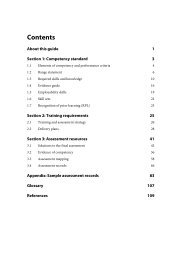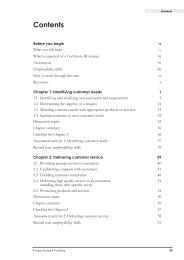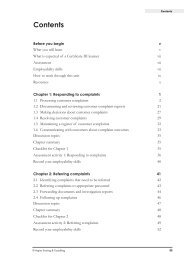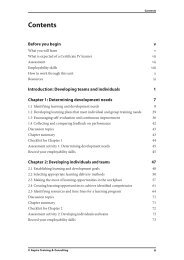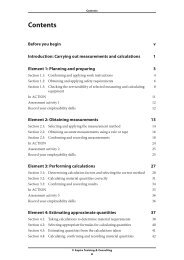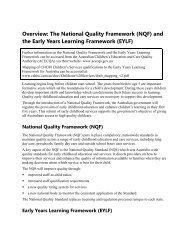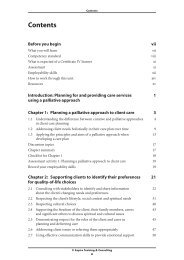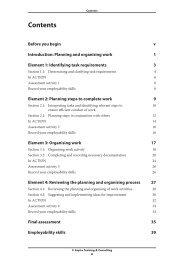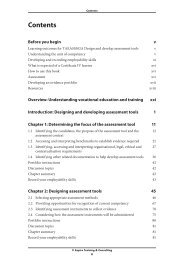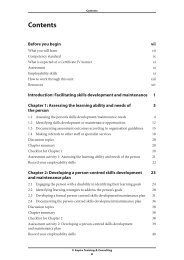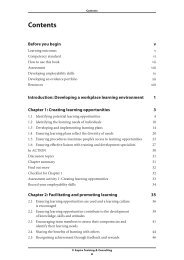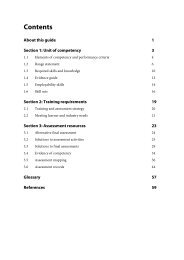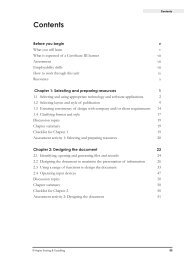CHCPOL504B Develop and implement policy - Aspire Learning ...
CHCPOL504B Develop and implement policy - Aspire Learning ...
CHCPOL504B Develop and implement policy - Aspire Learning ...
You also want an ePaper? Increase the reach of your titles
YUMPU automatically turns print PDFs into web optimized ePapers that Google loves.
Contents<br />
Contents<br />
Before you begin<br />
v<br />
How to work through this learner guide<br />
v<br />
Assessmentvi<br />
Resourcesvii<br />
Overview: The National Quality Framework (NQF) <strong>and</strong> the<br />
Framework for School Age Care (FSAC)<br />
ix<br />
Introduction: <strong>Develop</strong>ing <strong>and</strong> <strong>implement</strong>ing <strong>policy</strong> 1<br />
Chapter 1: Researching <strong>and</strong> consulting to develop policies 3<br />
1.1 Evaluating existing policies relevant to the organisation 4<br />
1.2 Undertaking research <strong>and</strong> consultation for <strong>policy</strong> development 10<br />
1.3 Consulting stakeholders during <strong>policy</strong> development 16<br />
1.4 Providing mechanisms to facilitate discussion about <strong>policy</strong> 21<br />
1.5 <strong>Develop</strong>ing policies that reflect the organisation 24<br />
1.6 Ensuring policies include implications for resourcing, <strong>implement</strong>ation<br />
<strong>and</strong> review mechanisms<br />
Discussion topics 30<br />
Chapter summary 30<br />
Checklist for Chapter 1 31<br />
Assessment activity 1: Researching <strong>and</strong> consulting to develop policies 32<br />
Record your employability skills 33<br />
27<br />
Chapter 2: Testing draft policies 35<br />
2.1 <strong>Develop</strong>ing <strong>and</strong> <strong>implement</strong>ing a consultation plan to test draft policies 36<br />
2.2 Discussing <strong>implement</strong>ation issues <strong>and</strong> modifying <strong>policy</strong> 42<br />
2.3 Notifying those affected in time to take remedial action 44<br />
Discussion topics 45<br />
Chapter summary 45<br />
Checklist for Chapter 2 46<br />
Assessment activity 2: Testing draft policies 47<br />
Record your employability skills 47<br />
© <strong>Aspire</strong> Training & Consulting<br />
iii
<strong>CHCPOL504B</strong> <strong>Develop</strong> <strong>and</strong> <strong>implement</strong> <strong>policy</strong><br />
Chapter 3: <strong>Develop</strong>ing <strong>policy</strong> materials 49<br />
3.1 Preparing <strong>policy</strong> materials to facilitate underst<strong>and</strong>ing <strong>and</strong> <strong>implement</strong>ation 50<br />
3.2 <strong>Develop</strong>ing <strong>policy</strong> proposals 55<br />
Discussion topics 59<br />
Chapter summary 59<br />
Checklist for Chapter 3 59<br />
Assessment activity 3: <strong>Develop</strong>ing <strong>policy</strong> materials 60<br />
Record your employability skills 60<br />
Chapter 4: Implementing <strong>and</strong> reviewing policies 61<br />
4.1 <strong>Develop</strong>ing <strong>and</strong> following the <strong>policy</strong> <strong>implement</strong>ation plan 62<br />
4.2 <strong>Develop</strong>ing <strong>and</strong> using information <strong>and</strong> promotion strategies for wide<br />
dissemination<br />
4.3 Reviewing policies 71<br />
Discussion topics 78<br />
Chapter summary 79<br />
Checklist for Chapter 4 79<br />
Assessment activity 4: Implementing <strong>and</strong> reviewing policies 80<br />
Record your employability skills 80<br />
67<br />
Final assessment: <strong>CHCPOL504B</strong> <strong>Develop</strong> <strong>and</strong> <strong>implement</strong> <strong>policy</strong> 81<br />
Employability skills 85<br />
Appendices87<br />
Appendix 1: How the learner guide addresses the unit of competency 87<br />
Appendix 2: Employability skills 90<br />
© <strong>Aspire</strong> Training & Consulting<br />
iv
Chapter 1: Researching <strong>and</strong> consulting to develop policies<br />
Chapter 1<br />
Researching <strong>and</strong> consulting to develop<br />
policies<br />
The operator of an outside school hours care (OSHC) service is responsible for ensuring<br />
that relevant policies are in place, <strong>and</strong> that they are current <strong>and</strong> appropriate for the<br />
setting. Whether you are undertaking an extensive <strong>policy</strong> review, or looking at one or<br />
two policies that have been ear-marked for evaluation, <strong>policy</strong> development needs to draw<br />
on significant background information. Using a range of internal <strong>and</strong> external sources<br />
contributes to <strong>policy</strong> documents that meet current industry <strong>and</strong> national regulations,<br />
best practice <strong>and</strong> the unique needs of your service.<br />
Input from stakeholders such as employees <strong>and</strong> families should be encouraged <strong>and</strong><br />
acknowledged, because individuals from different parts of the service can comment with<br />
different perspectives on the efficiency <strong>and</strong> effectiveness of current practices. Planning<br />
consultation processes is an effective way to ensure that feedback <strong>and</strong> recommendations<br />
are valid <strong>and</strong> sufficient.<br />
In this chapter you will learn about:<br />
1.1 Evaluating existing policies relevant to the organisation<br />
1.2 Undertaking research <strong>and</strong> consultation for <strong>policy</strong> development<br />
1.3 Consulting stakeholders during <strong>policy</strong> development<br />
1.4 Providing mechanisms to facilitate discussion about <strong>policy</strong><br />
1.5 <strong>Develop</strong>ing policies that reflect the organisation<br />
1.6 Ensuring policies include implications for resourcing, <strong>implement</strong>ation <strong>and</strong> review<br />
mechanisms<br />
© <strong>Aspire</strong> Training & Consulting<br />
3
<strong>CHCPOL504B</strong> <strong>Develop</strong> <strong>and</strong> <strong>implement</strong> <strong>policy</strong><br />
Steps involved in evaluation<br />
A <strong>policy</strong> document is a work in progress, <strong>and</strong> its currency <strong>and</strong> relevance need to be<br />
regularly reviewed. An evaluation reflects on what is currently happening in your<br />
service <strong>and</strong> how well the current policies reflect these practices <strong>and</strong> attitudes. It identifies<br />
processes that work well but that have not been recorded as <strong>policy</strong>, <strong>and</strong> the requirements<br />
for new processes to be developed.<br />
Removing obsolete references<br />
The first <strong>and</strong> most simple step of your evaluation is to scan existing policies for<br />
circumstances <strong>and</strong> terminology that no longer apply to your service. If there have been<br />
changes to your service since the <strong>policy</strong> was last reviewed, these changes can be reflected<br />
in new policies. Policies that contain out-dated or inaccurate details usually seem less<br />
authoritative overall, <strong>and</strong> are less effective in regulating procedures.<br />
This includes items such as:<br />
• obsolete staff titles<br />
• references to legislation or industry st<strong>and</strong>ards that are no longer current, such as the<br />
National Childcare Accreditation Council (NCAC) system<br />
• references to services that are no longer provided, or that are not provided in the<br />
same way.<br />
Identifying difficulties in <strong>policy</strong> usability<br />
Policy evaluation should consider the practicality of the <strong>policy</strong> document. These<br />
considerations include whether the <strong>policy</strong> is written in plain English <strong>and</strong> is easy to<br />
underst<strong>and</strong>. Having policies in more than one language can be appropriate for OSHC<br />
services that provide services to families from non-English speaking backgrounds.<br />
Identifying gaps in <strong>policy</strong> content<br />
Asking a series of questions as you evaluate each <strong>policy</strong> individually can help you to<br />
identify <strong>policy</strong> areas that may need improvement. Questions may include:<br />
• Does the <strong>policy</strong> fit with the philosophy, mission <strong>and</strong> goals of the OSHC service<br />
• Does the <strong>policy</strong> take into account the legislation that applies to OSHC<br />
• Are all policies required by the ACECQA National Quality St<strong>and</strong>ard included in<br />
the document<br />
• Do all relevant people follow the <strong>policy</strong><br />
• Are staff confused over the processes outlined in the <strong>policy</strong><br />
• Are the needs of the OSHC community reflected in the <strong>policy</strong><br />
The following example demonstrates how an OSHC supervisor evaluates existing<br />
policies to determine their currency <strong>and</strong> relevance to the organisation.<br />
© <strong>Aspire</strong> Training & Consulting<br />
8
<strong>CHCPOL504B</strong> <strong>Develop</strong> <strong>and</strong> <strong>implement</strong> <strong>policy</strong><br />
1.3 Consulting stakeholders during <strong>policy</strong><br />
development<br />
Continuous improvement is an ongoing process that all children’s services must<br />
practice. Consulting with stakeholders <strong>and</strong> receiving their feedback is an important part<br />
of continuous improvement. Consultation on <strong>policy</strong> to ensure relevance <strong>and</strong> acceptance<br />
of ideas is one example of how continuous improvement practice can provide better<br />
outcomes for children, staff <strong>and</strong> the community.<br />
Policies should provide consistent instruction in expected behaviour <strong>and</strong> responses<br />
to certain situations. If management were solely responsible for laying down policies<br />
without consultation with other stakeholders, they would be likely to reflect only the<br />
opinions <strong>and</strong> personal values of individual members of management. Instead, policies<br />
should be designed in a collaborative way, so that they reflect the needs <strong>and</strong> values of<br />
the whole organisation, its service users <strong>and</strong> the local community.<br />
Consultation can take place in many different ways. It can include formal meetings,<br />
emails, memos or formal written requests. Where there are geographic or time<br />
constraints, consultation my occur by teleconferencing or videoconferencing, or<br />
through surveys <strong>and</strong> questionnaires. A mix of several of these methods can be used to<br />
ensure a more comprehensive coverage of stakeholders.<br />
Stakeholders<br />
A stakeholder is an individual or group inside or outside the organisation who has some<br />
direct interest in the conduct, actions <strong>and</strong> outcomes of the organisation’s services. The<br />
development <strong>and</strong> <strong>implement</strong>ation of a <strong>policy</strong> usually impact on several groups, so all<br />
relevant stakeholders should be consulted when developing a <strong>policy</strong> or making changes<br />
to an existing one.<br />
Stakeholders can include:<br />
• colleagues<br />
• children<br />
• families <strong>and</strong> significant others<br />
• other organisations <strong>and</strong> professionals<br />
• government agencies<br />
• funding bodies<br />
• community groups<br />
• management.<br />
Colleagues<br />
Staff usually have experience <strong>and</strong> knowledge of gaps in <strong>policy</strong>, <strong>and</strong> the emerging needs<br />
of the service.<br />
© <strong>Aspire</strong> Training & Consulting<br />
16
<strong>CHCPOL504B</strong> <strong>Develop</strong> <strong>and</strong> <strong>implement</strong> <strong>policy</strong><br />
Aboriginal <strong>and</strong> Torres Strait Isl<strong>and</strong>er community organisations have a strong presence<br />
in both rural <strong>and</strong> urban regions, with some specialising in children’s services.<br />
Management<br />
Directors, school board members, finance managers, <strong>and</strong> work health <strong>and</strong> safety<br />
(WHS) personnel have responsibilities for guiding <strong>policy</strong>. Appropriate managers<br />
who can assess <strong>and</strong> direct <strong>policy</strong> formulation also include school principals <strong>and</strong> local<br />
council representatives. They can incorporate knowledge of both specific <strong>and</strong> broad<br />
areas of legislation in OSHC contexts to provide feedback about current <strong>and</strong> potential<br />
policies. OSHC management is responsible for making final decisions about what <strong>policy</strong><br />
is adopted. Managers can underst<strong>and</strong> the potential effects of <strong>policy</strong> in different ways,<br />
depending on your area of expertise, <strong>and</strong> the issues that you are currently involved with.<br />
In the following case study, an OSHC worker consults with a number of stakeholders<br />
about a <strong>policy</strong>.<br />
Case study<br />
Natalie recognises the need for consultation about the development of the asthma <strong>policy</strong>. To<br />
supplement the information she has received from speaking to a representative at the Asthma<br />
Foundation, Natalie plans the following meetings <strong>and</strong> discussions:<br />
• An interview with a GP, who can provide additional resources for asthma management<br />
• A meeting with the newly enrolled child <strong>and</strong> his parents, to discuss how proactive <strong>and</strong><br />
responsive policies could be designed to manage his asthma effectively<br />
• A phone call to the National Outside School Hours Services Association (NOSHA) for advice<br />
about the limitations placed on OSHC workers to administer asthma medication<br />
• Informal discussions with staff members to invite suggestions for non-technical language that<br />
is easily understood, to maximise the clear wording of the <strong>policy</strong><br />
After consultation with these parties, Natalie feels more confident that the <strong>policy</strong> not only meets<br />
legislative requirements, but that it is relevant for the staff <strong>and</strong> children who use the service.<br />
Practice task 3<br />
Identify one of the compulsory <strong>policy</strong> areas identified in the table in section 1.1 of this resource.<br />
Locate the <strong>policy</strong> area as it is described in the Guide to the Law <strong>and</strong> National Regulations on<br />
the ACECQA website. Keeping in mind the requirements of this <strong>policy</strong> that must be included<br />
in your service <strong>policy</strong> documents, create a table similar to the following, listing stakeholders<br />
who should be consulted to inform this <strong>policy</strong> area. Include a short description of the type of<br />
information you would seek from each.<br />
Policy area <strong>and</strong><br />
regulation number<br />
Stakeholder<br />
Reason for consultation<br />
© <strong>Aspire</strong> Training & Consulting<br />
20
Chapter 1: Researching <strong>and</strong> consulting to develop policies<br />
When developing <strong>policy</strong>, it is important to continually refer back to the philosophy<br />
statement <strong>and</strong> identify any conflict between the two statements. For example:<br />
• a <strong>policy</strong> that requires the organisation to dispose of all waste into the same receptacle<br />
is probably not committed to environmental sustainability<br />
• policies that prohibit non-enrolled siblings to enter the premises at any time may<br />
not fulfil a philosophy that states the importance of family to children’s wellbeing.<br />
Your service may operate in the not-for-profit sector in a socially disadvantaged area,<br />
with a philosophy to support social equity for all children, regardless of their family’s<br />
financial or social situation. Access to this service may include policies that prioritise<br />
enrolments <strong>and</strong> provide additional fee relief for families who can prove financial<br />
hardship.<br />
The following table outlines some practical variables that often differ between OSHC<br />
services.<br />
Service variables<br />
Type of service offered<br />
Administration <strong>and</strong><br />
management structure<br />
Staff ratios <strong>and</strong><br />
qualifications<br />
The children who attend<br />
the service<br />
The physical environment<br />
Cultures <strong>and</strong> languages<br />
spoken by service users<br />
Examples<br />
Some OSHC operate school holiday programs only, while others<br />
provide before school care, after school care or a combination of<br />
all three. Policies need to reflect the specific programs <strong>and</strong> activities<br />
that are held at the service, such as meals <strong>and</strong> excursions.<br />
Policies vary depending on whether the service is administered by:<br />
• the school to which it is attached<br />
• the local council<br />
• a not-for-profit organisation<br />
• a commercial organisation.<br />
When operated on a school site, OSHC policies must be in line with<br />
school policies, including behaviour support <strong>and</strong> fire evacuation<br />
procedures.<br />
Some policies require workers to take on more tasks or higher<br />
level responsibilities than they are trained to perform. Costs of staff<br />
training need to be considered in providing resources for <strong>policy</strong><br />
<strong>implement</strong>ation.<br />
Policies should reflect the number <strong>and</strong> age range of children who<br />
attend the service. They should take into account the presence of<br />
children with disabilities <strong>and</strong> children who come from different<br />
cultural backgrounds.<br />
The internal <strong>and</strong> external layout of your centre may lead to policies<br />
that are specific to the safety <strong>and</strong> wellbeing of children. These<br />
can include policies about security of the centre’s boundaries, <strong>and</strong><br />
restrictions for children <strong>and</strong> others to access certain areas.<br />
Policies may need to be written in several languages. They may<br />
refer to cultural practices that are specific to the makeup of the local<br />
community.<br />
© <strong>Aspire</strong> Training & Consulting<br />
25
<strong>CHCPOL504B</strong> <strong>Develop</strong> <strong>and</strong> <strong>implement</strong> <strong>policy</strong><br />
2.1 <strong>Develop</strong>ing <strong>and</strong> <strong>implement</strong>ing a consultation<br />
plan to test draft policies<br />
The process of producing a <strong>policy</strong>’s first draft already requires much research <strong>and</strong><br />
discussion. Up to this point, you consult with stakeholders to identify what the <strong>policy</strong><br />
should look like. When you have the first draft in h<strong>and</strong>, it is time to seek input <strong>and</strong><br />
feedback on how it will work when <strong>implement</strong>ed. It is inappropriate to <strong>implement</strong><br />
policies without first taking all measures to ensure their soundness <strong>and</strong> legality. This<br />
allows any required adjustments to be made so as to finetune the <strong>policy</strong> before the<br />
<strong>implement</strong>ation phase. Consultation <strong>and</strong> review are just as important at this stage in the<br />
process, before policies are signed off, as it was during the earlier development phase.<br />
Testing policies can involve one or more of the following options:<br />
• Consulting again with experts, consultants <strong>and</strong> other professionals who can look<br />
over the draft <strong>policy</strong> <strong>and</strong> make final comments or changes<br />
• Gathering a small sample of stakeholders to read <strong>and</strong> discuss the <strong>policy</strong><br />
• When it is safe <strong>and</strong> appropriate to do so, trialling the draft <strong>policy</strong> on a small scale<br />
in the workplace<br />
Policy draft reviews can call on the same groups of stakeholders as were consulted<br />
early in the <strong>policy</strong> development process. If you appointed a working group or <strong>policy</strong><br />
subcommittee, these representatives should still be working towards final approval <strong>and</strong><br />
<strong>implement</strong>ation. Relevant experts <strong>and</strong> legal representatives should review any draft<br />
policies that have legal <strong>and</strong> safety implications. Feedback on the draft <strong>policy</strong> should<br />
also be sought from staff, families <strong>and</strong> children.<br />
Collecting feedback<br />
Some organisations select several employees <strong>and</strong> family members to read the <strong>policy</strong>,<br />
ask questions <strong>and</strong> provide feedback. Test groups or sample groups can be selected from<br />
employees or other stakeholders who are most affected by the <strong>policy</strong>. Ask the group to<br />
read the <strong>policy</strong> through. At this point, it is important to ensure that these stakeholders<br />
can underst<strong>and</strong> <strong>and</strong> follow the <strong>policy</strong>. It can help to ask the group to consider a range<br />
of scenarios that might be relevant to the <strong>policy</strong>, <strong>and</strong> ask questions like, ‘What if … ’<br />
The <strong>policy</strong> should also be reviewed at this point with senior managers, the school<br />
principal <strong>and</strong> board members, since their support <strong>and</strong> approval is a crucial part of the<br />
<strong>policy</strong> being accepted.<br />
© <strong>Aspire</strong> Training & Consulting<br />
36
Chapter 2: Testing draft policies<br />
Assessment activity 2<br />
Testing draft policies<br />
Your trainer or assessor may require you to complete this assessment activity <strong>and</strong> will<br />
provide you with instructions as to how to present your responses. They may adjust the<br />
assessment activity depending on the circumstances of your training program.<br />
The following table maps the assessment activity for this chapter against the element<br />
<strong>and</strong> performance criteria of Element 2 in <strong>CHCPOL504B</strong> <strong>Develop</strong> <strong>and</strong> <strong>implement</strong> <strong>policy</strong>.<br />
Part Element Performance criteria<br />
Part A 2 2.1, 2.2, 2.3<br />
Part A<br />
Consider the Sun Protection <strong>policy</strong> that you researched in Assessment activity 1. Using<br />
the <strong>policy</strong> provided on the Sun Smart website (www.sunsmart.com.au/downloads/<br />
Protecting_others/oshc_sample_<strong>policy</strong>.pdf) as your draft <strong>policy</strong>, compile a report that<br />
includes the following information:<br />
1. How would you test this draft <strong>policy</strong> in your own workplace Using a table similar<br />
to the following, complete a consultation plan that outlines an appropriate testing<br />
<strong>and</strong> consultation schedule, including the individuals <strong>and</strong> experts who might be<br />
consulted. Include position titles rather than names.<br />
What needs to be done Who is responsible Date for completion<br />
2. What <strong>implement</strong>ation issues might arise from the draft <strong>policy</strong> if it was tested in your<br />
workplace Include references to the specific organisational culture, local climate,<br />
different programs <strong>and</strong> types of service you provide.<br />
3. What modifications would you need to make so that this <strong>policy</strong> better fits the<br />
particular needs of your service<br />
4. How would you inform stakeholders of the changes made to the final version of the<br />
<strong>policy</strong> Design a piece of written communication that refers to the modifications, to<br />
inform a group of stakeholders about the final changes.<br />
Record your employability skills<br />
When you have completed the assessment activity, make sure you record evidence<br />
of how you have developed employability skills. You may use the table following the<br />
final assessment for this purpose. Keep copies of material you have prepared as further<br />
evidence of your skills. Refer to the information on employability skills in Appendix 2<br />
of this learner guide for further guidance.<br />
© <strong>Aspire</strong> Training & Consulting<br />
47
Chapter 3: <strong>Develop</strong>ing <strong>policy</strong> materials<br />
Discussion topics<br />
Learners in a classroom can form a discussion group or have a debate. Those in the<br />
workplace might like to brainstorm these ideas with their colleagues. If you are learning<br />
independently, you might like to set up a chatroom with other learners or ask a friend<br />
for their opinion.<br />
• ‘One of the functions of policies is to protect the organisation from liability, so<br />
policies should be written using legal terminology.’ How would you respond to this<br />
statement<br />
• Do you think that policies should attempt to cover as many situations or contingencies<br />
as possible Why or why not<br />
• ‘Personal experiences have no place in a <strong>policy</strong> proposal.’ Do you agree<br />
• How much information is too much in a <strong>policy</strong> proposal to a committee of<br />
management or board Discuss.<br />
Chapter summary<br />
• The key to a successful <strong>policy</strong> <strong>and</strong> related procedures is presenting them in an easyto-underst<strong>and</strong><br />
format <strong>and</strong> style.<br />
• The final format <strong>and</strong> presentation of policies <strong>and</strong> procedures differs between<br />
organisations according to their specific needs.<br />
• Each <strong>policy</strong> option should be accompanied by a more detailed account of the<br />
procedures to be followed to achieve the <strong>policy</strong> goal.<br />
• Clustering policies in line with the format of the National Quality St<strong>and</strong>ard can<br />
make policies easier to present to auditors <strong>and</strong> assessors, <strong>and</strong> ensure compliance<br />
with OSHC requirements in a systematic way.<br />
• Write policies in clear, concise <strong>and</strong> consistent English, using language that is familiar<br />
to all stakeholders.<br />
• Policy proposals are written to address the identified need for <strong>policy</strong> development<br />
on behalf of service staff or families.<br />
• There is no universal format for <strong>policy</strong> proposals. Usually, the st<strong>and</strong>ard conventions<br />
for professional written communication apply.<br />
Checklist for Chapter 3<br />
Tick the box when you can do the following.<br />
<br />
Prepare <strong>policy</strong> materials to facilitate underst<strong>and</strong>ing <strong>and</strong> <strong>implement</strong>ation<br />
<br />
<strong>Develop</strong> <strong>policy</strong> proposals<br />
© <strong>Aspire</strong> Training & Consulting<br />
59
<strong>CHCPOL504B</strong> <strong>Develop</strong> <strong>and</strong> <strong>implement</strong> <strong>policy</strong><br />
Assessment activity 4<br />
Implementing <strong>and</strong> reviewing policies<br />
Your trainer or assessor may require you to complete this assessment activity <strong>and</strong> will<br />
provide you with instructions as to how to present your responses. They may adjust the<br />
assessment activity depending on the circumstances of your training program.<br />
The following table maps the assessment activity for this chapter against the element<br />
<strong>and</strong> performance criteria of Element 4 in <strong>CHCPOL504B</strong> <strong>Develop</strong> <strong>and</strong> <strong>implement</strong> <strong>policy</strong>.<br />
Part Element Performance criteria<br />
Part A 4 4.1, 4.2, 4.5<br />
Part B 4 4.3, 4.4, 4.6<br />
Part A<br />
Using the <strong>policy</strong> that you developed in Part B of Assessment activity 3, complete the<br />
following tasks:<br />
1. <strong>Develop</strong> a <strong>policy</strong> <strong>implement</strong>ation plan, including a task breakdown, to suit the<br />
requirements of your own organisation.<br />
2. Write a short report outlining the methods that you would use to disseminate,<br />
promote <strong>and</strong> publicise the <strong>policy</strong> to:<br />
a) staff<br />
b) children<br />
c) families.<br />
3. Using one of these methods, develop information in the appropriate format to educate<br />
staff, children or families about the <strong>policy</strong>’s introduction. Include information that<br />
explains the reason for <strong>and</strong> benefits of the <strong>policy</strong>, how it will be <strong>implement</strong>ed <strong>and</strong><br />
responsibilities of the relevant stakeholders.<br />
Part B<br />
Using the same <strong>policy</strong> as in part A, complete the following task.<br />
<strong>Develop</strong> an evaluation plan to review the <strong>policy</strong> in your workplace. Include evaluation<br />
strategies that to invite feedback from all relevant stakeholders. Make sure your<br />
plan includes realistic time lines for gathering feedback, reviewing the <strong>policy</strong> <strong>and</strong><br />
<strong>implement</strong>ing changes.<br />
Record your employability skills<br />
When you have completed the assessment activity, make sure you record evidence<br />
of how you have developed employability skills. You may use the table following the<br />
final assessment for this purpose. Keep copies of material you have prepared as further<br />
evidence of your skills. Refer to the information on employability skills in Appendix 2<br />
of this learner guide for further guidance.<br />
© <strong>Aspire</strong> Training & Consulting<br />
80



